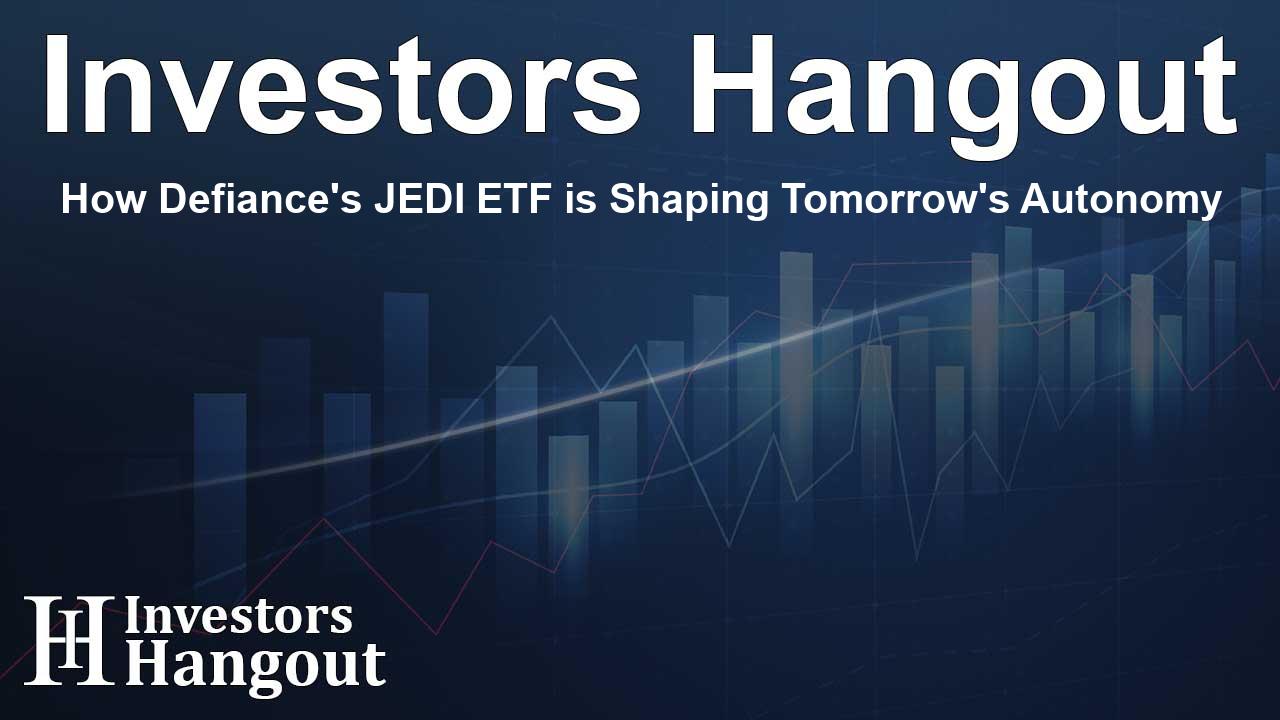How Defiance's JEDI ETF is Shaping Tomorrow's Autonomy

Introduction to Defiance ETFs and JEDI
Defiance ETFs is at the forefront of investing in drones and AI-driven autonomy, aiming to leverage these technologies as the foundation for defense and infrastructure transformation.
Understanding the JEDI ETF
According to Chief Investment Officer Sylvia Jablonski, the new Defiance Drone & Modern Warfare ETF (NYSE:JEDI) has been launched to capitalize on the revolution in drone technology, focusing on firms that are redefining both military and civilian drone applications.
The Investment Focus
JEDI sets itself apart from traditional defense funds by intentionally excluding legacy firms. Instead, it is dedicated to capturing innovators who are pushing the limits of modern warfare and autonomy. The ETF tracks the BITA Drone & Modern Warfare Select Index, which encompasses companies earning at least half of their revenue from sectors like military drones, unmanned systems, intelligence, surveillance, reconnaissance, space warfare, cybersecurity, and AI-centric IT.
Why Drones Matter
"Drones are pivotal in next-gen technology. They merge AI, robotics, data, and aerospace together," Jablonski remarked. JEDI is the inaugural ETF to encompass this paradigm shift, providing investors access to companies that are crafting the future of autonomy, extending beyond just defense to include agriculture, energy, supply chains, and infrastructure.
Geopolitical and Innovative Drivers
Jablonski has pointed out two key drivers for this paradigm shift: geopolitics and innovation. The U.S. government is increasingly emphasizing domestic drone manufacturing for better national security, and this trend is mirrored by the rapid commercial adoption of drones in areas like precision agriculture and on-demand delivery systems.
Portfolio Insights of JEDI
The structure of JEDI's portfolio reflects the dual nature of current opportunities. On the defense front, companies are innovating to create smarter and smaller unmanned systems. On the commercial side, drones are transitioning from mere hardware into a broad ecosystem, according to Jablonski. She describes drones as evolving into flying data centers, where AI fosters autonomous decision-making, predictive logistics, and advanced operational capabilities.
Global Perspectives
While JEDI predominantly features U.S. companies due to policy and spending priorities, it also includes international companies from regions like Israel, Europe, and Asia. The ETF uniquely merges high-growth startups with established manufacturers, giving investors both innovative exposure and predictable revenue generation.
Navigating Regulations and Future Outlook
Regulatory aspects, including export controls and FAA regulations, remain significant factors in the industry. However, Jablonski perceives these regulations as barriers that could actually benefit established companies that are already deeply integrated into the sector. With a diversified approach across hardware, software, and various applications, JEDI has been strategically structured to mitigate risks and volatility. Despite primarily being seen as a growth-focused ETF, it also includes select companies with consistent cash flow to provide an added layer of stability.
The Future of Drone Technology
Jablonski argues that this blend of characteristics makes drones a unique sector, offering opportunities during fluctuating market conditions. In times of financial uncertainty, having defense exposure can provide stability, while in more favorable scenarios, advancements in commercial AI can drive returns. She anticipates that within the next several years, drones will evolve into a standard component of infrastructure, becoming as integral as satellites in defense and as ubiquitous as delivery vans in commercial scenarios, leading to robust growth within the industry.
Staying Ahead with JEDI
To ensure it remains aligned with rapid technological advancements, JEDI is set to rebalance its portfolio quarterly, focusing on emerging players within the realms of drones, AI, and autonomy.
Frequently Asked Questions
What is the focus of the Defiance JEDI ETF?
The JEDI ETF targets companies involved in modern warfare and drone technology, excluding traditional defense primes.
Who is behind the JEDI ETF?
Defiance ETFs, under the leadership of CIO Sylvia Jablonski, has developed the JEDI ETF.
How does JEDI plan to support portfolio growth?
JEDI plans to rebalance its portfolio quarterly to stay responsive to rapid innovations in the drone and AI sectors.
What distinguishes JEDI from traditional defense funds?
JEDI intentionally avoids investing in older defense companies, focusing instead on innovators and companies at the edge of modern technology.
What future growth is expected in the drone sector?
The drone industry is projected to grow significantly, evolving into a common aspect of infrastructure both commercially and in defense applications.
About The Author
Contact Riley Hayes privately here. Or send an email with ATTN: Riley Hayes as the subject to contact@investorshangout.com.
About Investors Hangout
Investors Hangout is a leading online stock forum for financial discussion and learning, offering a wide range of free tools and resources. It draws in traders of all levels, who exchange market knowledge, investigate trading tactics, and keep an eye on industry developments in real time. Featuring financial articles, stock message boards, quotes, charts, company profiles, and live news updates. Through cooperative learning and a wealth of informational resources, it helps users from novices creating their first portfolios to experts honing their techniques. Join Investors Hangout today: https://investorshangout.com/
The content of this article is based on factual, publicly available information and does not represent legal, financial, or investment advice. Investors Hangout does not offer financial advice, and the author is not a licensed financial advisor. Consult a qualified advisor before making any financial or investment decisions based on this article. This article should not be considered advice to purchase, sell, or hold any securities or other investments. If any of the material provided here is inaccurate, please contact us for corrections.
